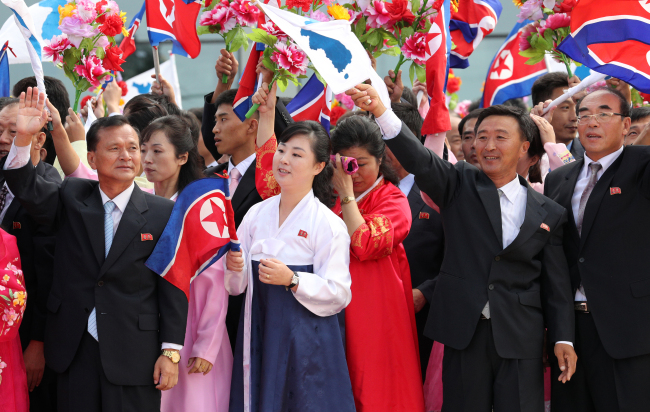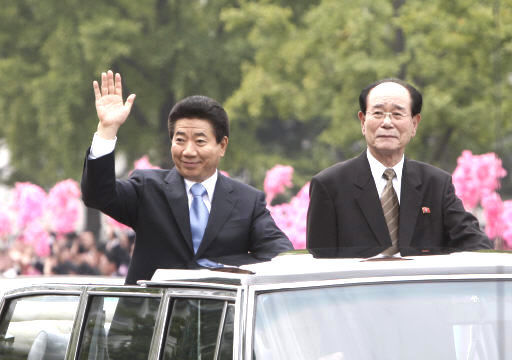One of the major differences that distinguishes South Korean President Moon Jae-in’s latest trip to Pyongyang from previous inter-Korean summits is the live broadcast of the event.
The summit scheduled from Tuesday to Thursday is the first time the communist nation has agreed to broadcast segments of an inter-Korean summit held in its capital city live.
 |
South Korean President Moon Jae-in (left) and North Korean leader Kim Jong-un participate in an open-car parade in Pyongyang. (Joint Press Corps) |
Though photos and recorded footage of the summits in 2000 and 2007 were allowed, the live broadcast permitted reporters and viewers outside Pyongyang to get a more vivid image of the “rock star” reception the North prepared for the South Korean leader.
For all three Pyongyang summits so far, the North Korea’s military honor guard and large crowds of North Koreans waving bouquets of colorful flowers have welcomed the arrival of the South’s president.
North Korea’s state media, on the other hand, did not broadcast Tuesday’s events live, though they will likely release the footage later, after editing and censoring it.
Moon’s latest trip draws several parallels to the first inter-Korean summit in 2000 between President Kim Dae-jung and North Korean leader Kim Jong-il, with the North Korean leader also greeting his South Korean counterpart at Sunan International Airport.
 |
(Yonhap) |
Moon used the same air route over the West Sea that Kim Dae-jung used. In 2007, the South’s President Roh Moo-hyun crossed the military demarcation line -- the border that bisects the two Koreas -- on foot, and traveled to Pyongyang by road.
The three Pyongyang summits showed striking similarities, but differences in the details were evident.
While meetings between the top Korean leaders previously kicked off on the second days of the summits, Moon and Kim entered talks on the first day this time after separate luncheons. Observers believe the two headed straight for the talks to address imminent issues surrounding the peninsula without unnecessary formalities, as they had already held two summits in April and May.
North Korean first lady Ri Sol-ju’s presence alongside her husband at the airport was also a noteworthy difference from previous summits, as Kim Jong-il’s wife Kim Young-sook was notably absent at both the 2000 and 2007 welcoming ceremonies. Before Ri, the wives of the North’s leaders typically stayed out of the public eye.
The North Korean crowd at the ceremony also held the Korean Unification Flag, depicting the image of a unified Korean Peninsula in blue, alongside the North Korean flag for the first time.
 |
Late South Korean President Roh Moo-hyun and North Korea`s nominal head of state Kim Yong-chol rides in an open-car parade in 2007, in Pyongyang, North Korea. (Yonhap) |
On Tuesday, Moon and Kim rode in an open-car motorcade through Pyongyang on their way from the airport to the Paekhwawon State Guest House. In 2007, Roh rode in a similar open-car parade, but instead of his then-counterpart Kim Jong-il, the North’s nominal head of state Kim Yong-nam accompanied him.
Kim Yo-jong, Kim Jong-un’s sister and first vice director of the Central Committee of the ruling Workers’ Party, was also at the airport on Tuesday. This is the fifth inter-Korean summit ever and third meeting between Moon and Kim Jong-un.
By Jung Min-kyung (
mkjung@heraldcorp.com)










